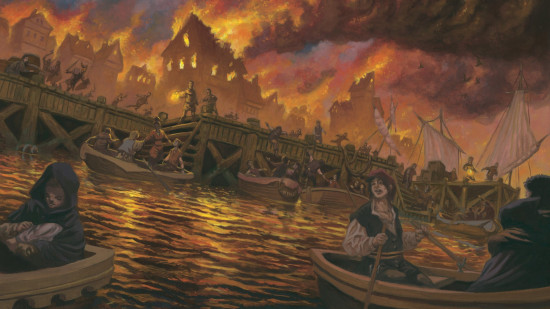When it comes to DMing, I’m the D&D equivalent of a doomsday prepper. Each session plan features three, four, or more possible scenarios that player choices could trigger. I’ve usually thought of everything. However, for the first time in our two-year campaign, my current Dungeons and Dragons party caught me off guard. It was glorious, and I hope it happens again.
This isn’t the first time I’ve realized that a little bit of laziness can benefit my D&D game. I once played a session run by top designer Jeremy Crawford, and that showed me how much fun can be created with minimal prep. Letting go is a lesson I’m still learning, though, and this most recent surprise was another moment of education.
For the benefit of all plan-happy DMs who might get caught with their pants down, here are a few tips for winging it last-minute.
Don’t panic
So, the worst has happened. For months, your party has been working towards a story-changing event. That moment is going to influence the narrative of the entire DnD campaign, and it’ll probably involve a lengthy, epic boss encounter. You’ve prepped several minigames and roleplaying moments, and you’ve repeatedly tested your monsters for balance.
Then, at the last moment, the group pivots. They’re not going to the party you planned at all. This is exactly what happened to me.
The most important thing is not to panic. Despite how things might appear, not everything in your planning docs is lost. Minigames and random encounters can be repurposed and moved to another point in your story. Key events can still happen without the players being there to witness them (and this in itself can present interesting storytelling opportunities).
If you love to plan D&D games, you’ve likely spent hours dwelling in this world, both inside your own head and at the table with your friends. Those daydreams and past sessions helped create a living, breathing world, with characters and locations your players can believe in. Trust yourself to improv what NPCs would say next, and trust your players to help you move things forward with their actions.
It’s important to remember that no one else can see behind your DM screen. As far as the players are aware, everything is going according to plan. With enough confidence, they won’t notice an emergency pivot at all.
If panic does seem to be overwhelming you, ask your players for a short break. While it feels great to maintain the illusion that all is going to plan, there’s also zero shame in admitting it isn’t. “This session has gone somewhere unexpected, and I need a few minutes to plan the next encounter” is a perfectly acceptable sentence to say.
Listen to what the players want
D&D is a collaborative storytelling game, which is great news for the unprepared DM. It may often look like you’re in charge of driving the story forward, but the players have just as much power to shape the narrative. You’re presenting them with the prompt, but they’re the ones filling in the blanks.
When players stray from the prepared path, this is an opportunity to sit back and listen. Let them take charge of what’s happening, and focus on responding to and building on their roleplay.
Why have they suddenly derailed, and what about this derailment excites them the most? What locations or NPCs are they particularly focused on, and can you use these as inspiration for your next encounter or story beat?
Of course, the player isn’t always right. A wild murder hobo may appear, cutting down NPCs on a whim, ignoring any obvious plot hook, and being a nuisance to other player-characters. In these cases, gently but firmly getting the group back on track is recommended. However, if you’ve established trust and clear communication at your table, you should be able to hand the creative reins to your players now and then – with minimal murders as a result.
Turn this into an opportunity
When a plan flies out the window, don’t focus on the sunk cost. The reason you enjoy planning D&D sessions is that you love dreaming up story ideas and crafting encounters. Well, good news – derailment means you get to go through that whole process again!
In my case, I’d had the encounter above planned for months. I’d begun to rest on my laurels, knowing all the prep was done for several sessions to come. Having to adjust these plans feels invigorating, as it’s a chance to stretch my creative muscles again.
I won’t share many details about how this moment has changed my D&D campaign (because I know you’re reading this, Dink the DnD Wizard). However, becoming derailed has prompted me to prep an entirely new dungeon, several new random encounters, and some small plot hooks we’d previously left behind.
The story moves forward, even if it isn’t in the way I expected. That’s the beauty of a tabletop RPG; it’s not a fiction book with a set beginning, middle, and end. It grows and changes as you do. Focus on enjoying that, and becoming derailed looks less like a flaw and more like part of the creative process.
For more Dungeons and Dragons advice, here’s all you need to know about DnD classes and DnD races. We can also keep you up-to-date with the latest books coming up on this year’s DnD release schedule.
Source: Wargamer




